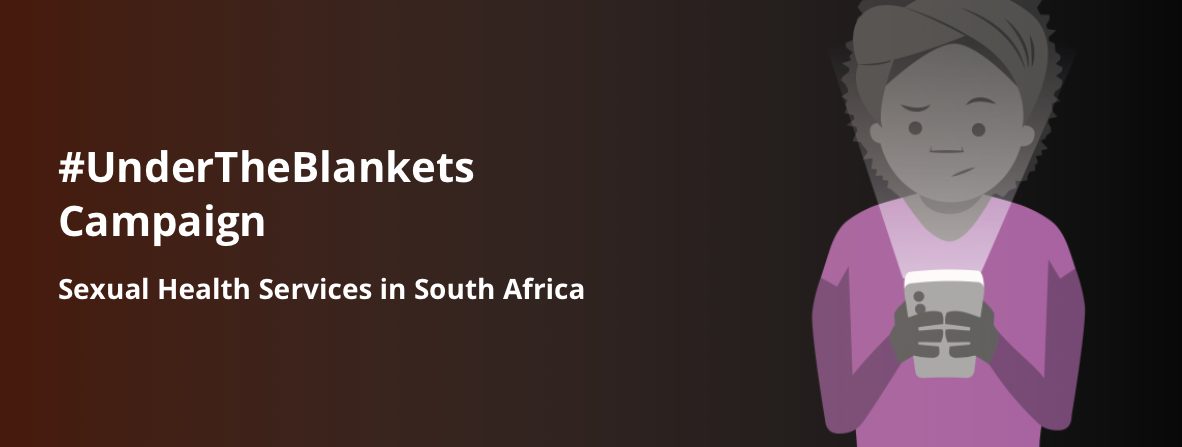In the run up to Valentine’s Day next week, Sonke Gender Justice is launching a new campaign on migrants’ and refugees’ rights to access sexual and reproductive health services in South Africa.
Our #UnderTheBlankets campaign encourages anyone – South African or not – to visit a webpage and read about how they can access government sexual and reproductive health services in South Africa. The campaign also seeks to remind healthcare workers that everyone in South Africa, regardless of nationality, has a right to access reproductive healthcare.
What are refugees’ and migrants’ rights to access sexual health in South Africa?
Everyone is entitled to free primary health care services in South Africa. Any woman – regardless of nationality – wanting a termination of pregnancy (abortion) is entitled to receive that for free.
All pregnant and lactating women and all children under six years old are entitled to free hospital care. Outside of this, if a person is from a country in Southern Africa (SADC), they are entitled to be treated the same as a South African citizen at the hospital. This means that the treatment will be “means tested” (the fee depends on their circumstances). This applies to people from the SADC region, whether they have a South African ID, refugee status, an asylum seeker document – or no document at all.
What are sexual health and reproductive rights?
Sexual and reproductive health rights cover a broad spectrum of rights. It includes the ability to: choose your partner, choose whether you want children or not, express your gender and sexuality, access contraception and get tested for sexually transmitted diseases (STDs), among others. For women it includes the ability to access services around a termination of a pregnancy, menstrual health and maternal health.
Why is this campaign important?
Refugees and migrants in South Africa can struggle to access healthcare in South Africa. Whilst some research finds foreign nationals’ access to public healthcare to be good, other research has previously found that ‘medical xenophobia is deeply entrenched in the South African public health system’, and research samples struggled, typically, to access public healthcare.
Health affects us all, as humans – regardless of nationality. To improve South Africa’s sexual and reproductive healthcare as a nation, we need to include every person within her borders. Sonke Gender Justice advocates for the realisation of our constitutional right – wherever we come from – to access reproductive healthcare in South Africa.
Which resources does the campaign provide to people?
The campaign webpage contains important information about accessing sexual health. It aims to challenge taboos and secrecy around sexual and reproductive health by sharing real-life stories from refugees and migrants – such as Badr Afafand Abey – accessing healthcare in South Africa.
The campaign webpage also points people towards a data-free map, made by Bhekisisa, which shows both government (free) clinics and private clinics near the user’s location. The campaign webpage also lists organisations and NGOs that can assist people, whatever their nationality is, to access sexual and reproductive healthcare in South Africa.
Meanwhile, healthcare workers are reminded of the universal access to reproductive healthcare via a video portrait from Sister Mhaka, a midwife working in a busy clinic in Maitland, Cape Town. Her written story can be read here, too.
About Sonke Gender Justice
Sonke Gender Justice is a South African-based non-profit organisation working throughout Africa. We believe women and men, girls and boys can work together to resist patriarchy, advocate for gender justice and achieve gender transformation.
Further information
For further information please contact Given Sigauqwe, Communications and Strategic Information Unit Manager, on [email protected] or 073 988 2870.
__Abey* has given birth three times in South Africa – and each experience has been very different – from giving birth during the 2008 xenophobic attacks to being referred for sterilsation against her knowledge. Abey, who is originally from Angola herself, wants to see people from migrant backgrounds talk more openly about sexual health. She encourages people like herself to find out information online and empower themselves, so that they can stand up for themselves in clinics and hospitals. Read Abey’s story here: genderjustice.org.za/undertheblankets/abey #UnderTheBlankets”


